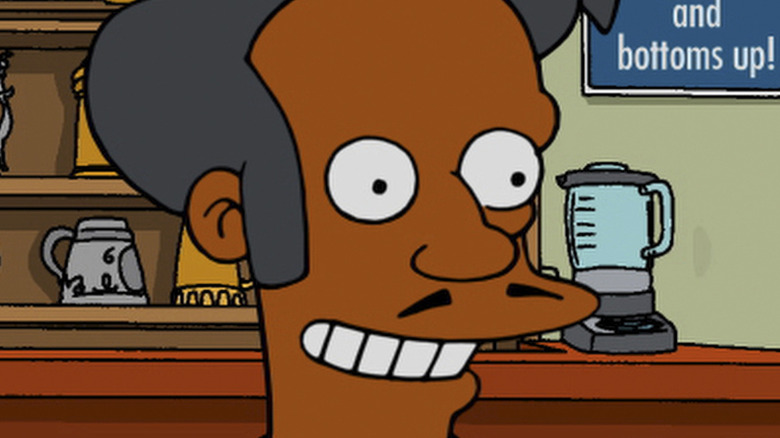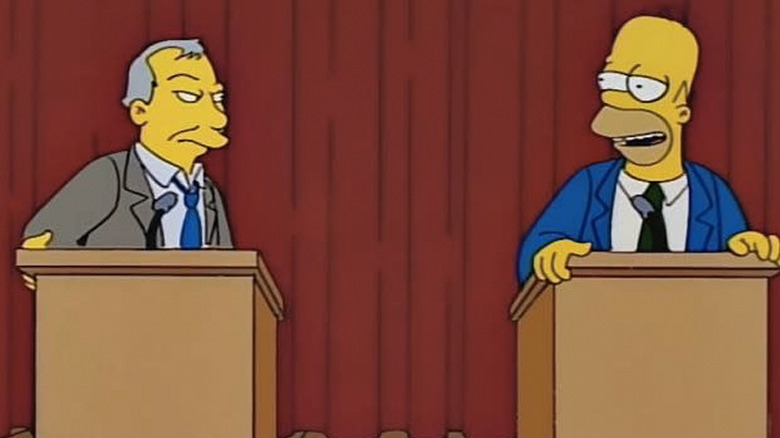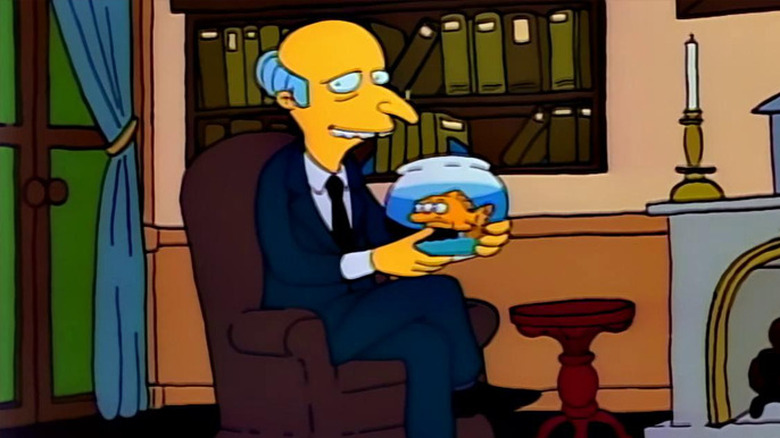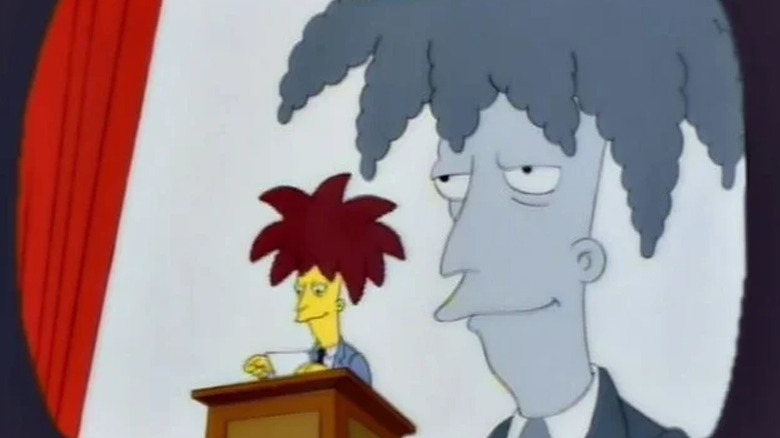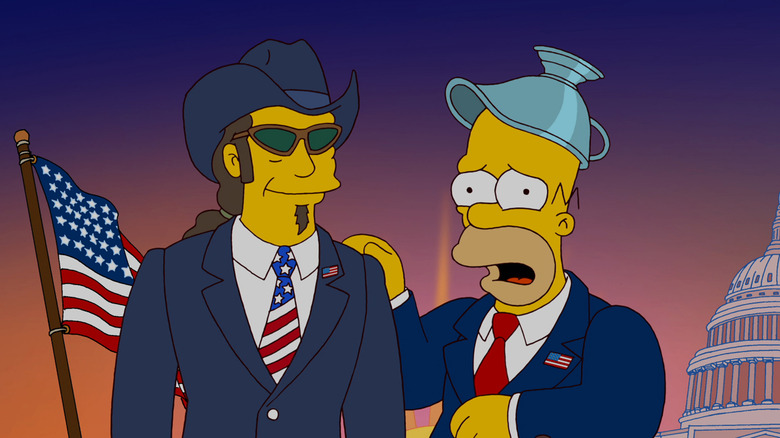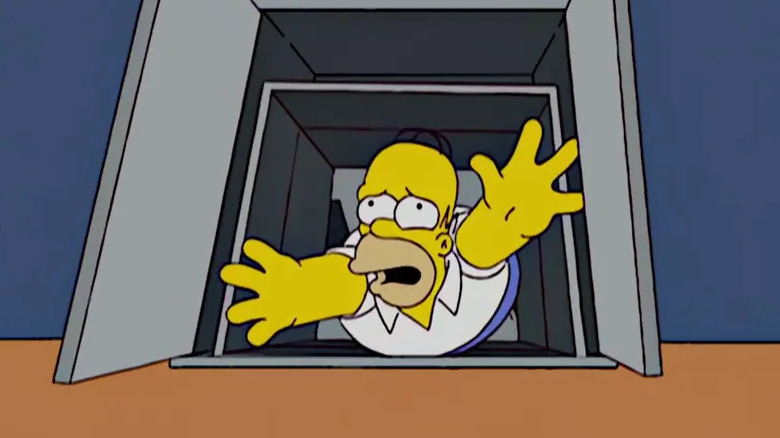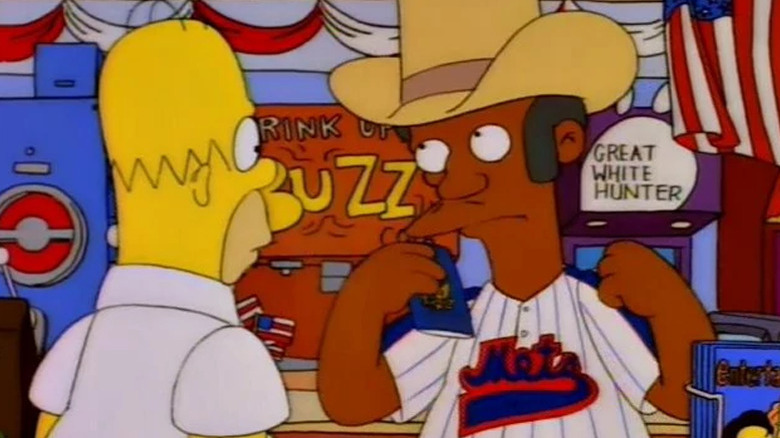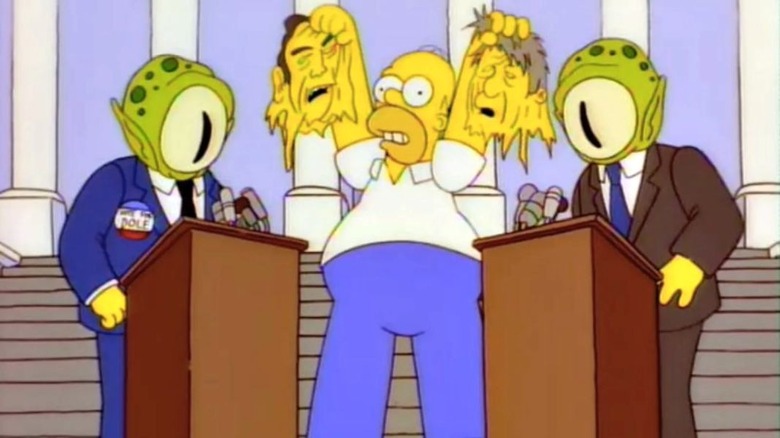The Many Times The Simpsons Got Political
Unless we count stuff like current events programs and professional sports, basically no other TV show has lasted as long or covered as much ground as "The Simpsons." Since their debut in 1989, the denizens of Springfield have lampooned every topic under the sun. From the world of cinema to controversial real-world topics; if it's a thing that exists, there's a good chance that it's been the focus of an episode of "The Simpsons." But for as much as the show has changed with the times, it continues to comment on political issues. In some instances, the show has even predicted future events — like the time "The Simpsons" foresaw the existence of President Trump, for example
The show has generally been smart about not appearing biased or one-sided in its political humor. Regardless of what stance "The Simpsons" takes, what's important is that it comes accompanied by a plethora of laughter. These are just a few notable examples of the many times that "The Simpsons" got political.
Homer runs for Sanitation Commissioner
This example of "The Simpsons" getting political has become more relevant in recent years for reasons we'll discuss. The story of "Trash of the Titans" — or Episode 22 of Season 9 — begins when Homer's casually abuse attitude results in Springfield's garbage men refusing to pick up his trash. Marge only exasperates the matter when she forges Homer's signature on a written apology to Sanitation Commissioner Ray Patterson, voiced by comedy legend Steve Martin. Hardly a paragon of rationality, Homer decides to confront Patterson and subsequently run against him for the position of Springfield's sanitation commissioner.
Homer accomplishes this goal with a campaign that's heavily predicated on empty promises and crass humor. Once he's sworn into office, Homer, in grand fashion, blows through the entire department's yearly budget in a month, causing the garbage men to quit. This leaves Springfield as a trash-covered wreck which all citizens, including the Simpsons, are forced to depart. "Trash of the Titans" serves as a cautionary tale illustrating the ease with which a sleazy and unqualified political dilettante can snag an influential government role with lies and smear tactics. Some folks might look at events that unfolded roughly 18 years after this episode's original 1998 airdate and suggest the American people should've taken "Trash of the Titans" more seriously.
Mr. Burns runs for mayor
A rich, miserly old white man getting involved in politics? Even for "The Simpsons," that might be a stretch. The character of C. Montgomery Burns has been a pillar of the series going as far back as the pilot. At his core, Mr. Burns portrays the corrupt 1% that makes life harder for the blue-collar workers of America. This is often portrayed through his various material extravagances, comically advanced age, and comic book supervillain-style schemes. For one example of an evil plan, Mr. Burns attempts to become state governor in order to avoid consequences for various environmental violations at the Springfield Nuclear Power Plant. Also, the three-eyed fish Bart and Lisa find swimming in a nearby river definitely makes the power plant look like a public safety nightmare.
Due to his immense resources and team of political advisers, Mr. Burns — via propaganda and rampant dishonesty — ties the polls. Due to his employment at the plant, Homer helps Burns' campaign, much to Marge and Lisa's chagrin. Things bode well for Burns until a dinner at the Simpson residence where Marge presents his meal — the three-eyed fish. Upon taking a bite and puking up the crime against nature, Mr. Burns' campaign is sunk, and he swears revenge on Homer and his family. "Two Cars in Every Garage and Three Eyes on Every Fish," aka Episode 4 of Season 2, has a simple yet effective message about the corrupt, often underhanded nature of political campaigns.
The IRS comes for Homer
"The Trouble with Trillions," Episode 20 of Season 9, sees Homer dealing with one of America's most loathed institutions: the Internal Revenue Service. It's Tax Day in Springfield and Homer has absentmindedly waited until the eleventh hour to file. Soon enough, Homer is hauled in by the government on suspicion of tax fraud. With plenty of leverage on Homer, the FBI strong-arms him into becoming an asset to help them with various jobs on their docket. One such task sees Homer, under the guise of a reporter, trying to reclaim a stolen trillion-dollar bill from Mr. Burns.
But before the FBI can spring their trap on Mr. Burns, Homer is swayed by his boss' anti-government argument and decides to switch sides. The duo, with Smithers in tow, flee to Cuba where President Fidel Castro effortlessly and instantly scams them out of the trillion-dollar bill. Soon enough, the Springfieldian trio find themselves on a raft, and Burns expresses full confidence he can bribe their way out of this situation. It's a hysterical look at not only everyone's least favorite non-holiday, Tax Day, but government as a whole.
Homer Simpson vs. George H.W. Bush
During his 1992 re-election campaign, the real George H. W. Bush took an infamous shot at "The Simpsons." A few years later, the show's writers turned this jab into a classic episode. In "Two Bad Neighbors," Episode 13 of Season 7, none other than George H. W. Bush and his wife Barbara move to Evergreen Terrace. Bart makes a nuisance of himself and quickly draws the ire of the 41st POTUS. After Bart's general mayhem leads to the destruction of George's memoirs, he picks up Bart and gives him a spanking, which enrages Homer.
This sparks a game of one-upmanship that sees Homer and George making each other's lives a living hell. This includes the Bart and Homer gluing a clown wig to Geroge's head right before he's scheduled to make an important speech. Eventually, Homer and George erupt into an all-out fist fight. Barbara, recognizing the feud has gone too far, forces George to apologize. The Bushes depart Springfield, leaving their house available for purchase from another former president — Gerald Ford. The episode ends with Gerald and Homer quickly becoming friends. While possibly inspired by spite as much as anything else, "Two Bad Neighbors" stands as an absolute gem all these years later.
Sideshow Bob runs for mayor
In terms of villainy in "The Simpsons" universe, one need not look further than the escapades of Sideshow Bob Terwilliger, voiced by Kelsey Grammer. Originally depicted as Krusty's harmless sidekick, Sideshow Bob turned criminal genius and established himself as one of the show's recurring antagonists. At various points, Sideshow Bob frames Krusty for armed robbery, threatens Bart's life multiple times, and tries to kill Aunt Selma; so obviously, his natural next step is a run for public office. Sideshow Bob's villainy reaches new heights in "Sideshow Bob Roberts," Episode 5 in Season 6, in which Sideshow Bob cons his way into becoming Springfield's mayor. Sideshow Bob uses the right-wing rhetoric of television host Birch Barlow to sway public opinion in his favor — resulting in his release from prison.
Soon enough, Sideshow Bob swindles his way into office and begins using his power to attack the Simpsons. Not only is a new expressway zoned to plow right through their home, but Bart finds himself demoted back to kindergarten. Bart and Lisa search for the truth behind Sideshow Bob's election victory and discover many voters who official records say pulled the lever for Sideshow Bob are actually long dead. During the subsequent trial, Bart and Lisa manipulate Sideshow Bob into confessing by insinuating he isn't smart enough to have come up with this plan himself. The episode boasts many stand-out laughs and certainly ranks amongst the most memorable Sideshow Bob episodes.
Lisa drains the swamp
Without question, the most politically conscious and active member of the Simpsons family is definitely Lisa. "Mr. Lisa Goes To Washington," Episode 1 of Season 3, marks some of the show's earliest uses of political themes and ideas. After advancing in an essay contest, Lisa and the rest of the Simpsons travel to Washington, D.C., for a presentation with other successful contestants. The essay itself is inspired by some majestic, patriotic imagery Lisa saw in the Springfield Forest.
All is going well for Lisa until she receives a harsh dose of reality while visiting the statue of a feminist icon. She sees the corrupt nature of politics firsthand as a scummy congressman accepts a bribe to allow loggers to cut down Springfield Forest. This results in a tearful Lisa ripping up her essay and using her time on stage to expose the true America with a new essay titled "Cesspool on the Potomac." This is not without consequence; Lisa's words spread throughout Washington in record time and the corrupt congressman is promptly arrested.
Homer becomes a Fox News pundit
"The Simpsons" have made a gag out of everything and everyone throughout their run, including the oversaturation of news media. In the episode "Politically Inept, with Homer Simpson," Episode 10 of Season 23, we see Homer thrust into an unexpected position of power. Following a viral public tirade-slash-meltdown on an airplane, Homer finds himself on a cable news talking heads show called Head Butt. Citing himself as a speaker for the common man, the patriarch of the Simpsons winds up the host of his own show — "Gut Check with Homer Simpson." During this new phase of his career, Homer preaches hyperbolic, right-leaning rhetoric involving freedom and gravy.
Homer's show eventually gains such a following that the Republican Party tasks him with choosing their next candidate. Homer picks none other than washed-up '70s rock star and gun enthusiast Ted Nugent. The family, especially Lisa, look to deter Homer from this decision. After he sees the light and recognizes the game he's been playing for the cynical and manipulative farce that it is, Homer denounces his previous views. Given how big a role the mainstream news and talk shows play in our media diets, this episode definitely hit all the right notes.
Bart runs for class president
Throughout the show's ongoing run, both Simpson siblings took a swing at scholastic politics, although they take very different approaches to their campaigns. In the subplot of the classic episode "Lisa's Substitute," Episode 19 of Season 2, Bart runs for class president. Mirroring his father's campaign for sanitation commissioner, Bart employs tactics including false promises and lowbrow humor to garner support. All bodes well for Bart until the actual election comes around and almost everyone, certain of Bart's victory, neglects to vote. This results in Martin winning with a grand total of two votes, much to the joy of Martin and Mrs. Krabappel.
Naturally, Bart finds this situation disheartening until Homer points out that the position would've made him much busier and doesn't pay anything. It's a rare but poignant example of Homer, despite his frequent oafishness, succeeding at parenting ... kind of. While more of a microcosm of politics in an academic setting rather than a comment on actual politics, the story showcases how important the act of voting is. "The Simpsons" makes it clear that it's never enough to say you support someone — you need to take action to support them.
Lisa runs for class president
Here's yet another example of Lisa getting involved in the world of politics. In "The Kid Is All Right," Episode 6 of Season 25, Lisa makes friends with a new student named Isabel voiced by Eva Longoria. All seems well with her new companion until a joint presentation on President Franklin D. Roosevelt in which Isabel reveals her right-wing views. Soon enough, Lisa and Isabel find themselves opposing each other in the election for second grade class representative. Adding fuel to the fire, fellow Republican Mr. Burns begins aiding Isabel's campaign despite her prior refusal of his help.
The race is close and hard fought with both girls bringing fair points to the table, dividing the school on who to choose. Lisa sadly loses the election but finds comfort knowing that her liberal-leaning ideas are ultimately more popular. The episode shows it's important to hold onto your beliefs and principles without letting them cloud your ethics.
A voting machine eats Homer
The "Treehouse of Horror" Halloween specials are an annual excuse for "The Simpsons" to run buck wild and do whatever they want. In the cold open of "Treehouse of Horror XIX," Episode 4 of Season 20, it's Election Day 2008 and Homer is looking to cast his vote. Upon realizing he's too big for the normal voting booths, Homer is told to use the "double wide." Upon entering, Homer finds an electronic voting machine with the options of Barack Obama and John McCain.
However, when Homer attempts to vote for Obama, the machine automatically changes his vote to McCain, sending Homer into a blind rage. The device proceeds to open up and swallow Homer. Once inside, Homer is subjected to what sounds like buzzsaws and various other torture apparatuses killing him mercilessly. The machine heaves out Homer's lifeless body and someone comically places an "I Voted" sticker on him. It's an utterly priceless take on the then-very heated 2008 presidential election which heavily dominated the news cycle of the day.
Apu fights for his citizenship
In recent years, the character of Apu Nahasapeemapetilon has been subject to a sizable amount of scrutiny. The overall gist of the comparatively recent discourse can be found in Hari Kondabolu's 2017 documentary "The Problem with Apu." Kondabolu's film breaks down the harmful stereotypes associated with Apu and how his portrayal hasn't aged very well. Hank Azaria, the voice of the character, ultimately agreed with the criticisms and no longer plays Apu.
"The Simpsons" obviously could've approached their Indian American characters with far more sensitivity over the years, but at least we can say the intentions behind Apu weren't necessarily mean-spirited all the time. For instance, "Much Apu About Nothing," episode 23 of Season 7, highlights Apu in order to comment on anti-immigration rhetoric.
In the episode, Mayor Quimby creates Proposition 24, a referendum measure designed to deport all illegal immigrants from the town of Springfield. Soon enough, Apu finds life as he knows it in jeopardy and begins looking for a way to remain in the United States. With the help of the Simpsons, primarily Lisa, Apu legally earns his citizenship and the legal right to remain in Springfield. It's a sobering yet comedic look at the challenges faced by immigrants in the United States which rings true today.
Kang and Kodos run for president
In modern politics, there has been an unfortunate trend of presidential elections where neither candidate is truly appealing for American voters. "The Simpsons" took an early swing at this trend with the "Citizen Kang" vignette in "Treehouse of Horror VII," Episode 1 in Season 8. Homer finds himself abducted by the recurring alien duo of Kang and Kodos, both looking to enslave the Earth. Upon asking Homer who the United States' current leader is, he informs them that they've arrived amid the 1996 presidential election. Soon enough, the alien duo abscond with both candidates, Bill Clinton and Bob Dole, and take their places. Homer is able to locate the two real candidates, but due to his buffoonery, he accidentally ejects them into space, condemning them to a horrible death in the abyss of the cosmos.
Homer reveals the truth to the world, but Kang and Kodos note that it's still a two-party system, which means there is no third option. The vignette ends with the world enslaved under Kang, with Homer comedically noting that he voted for Kodos. It's a hilarious short that shows that oftentimes in politics, the average voter is forced to choose between two less than ideal options. It's definitely an episode entrenched in the politics relative to its release, but one that still packs a sizably humorous punch.
